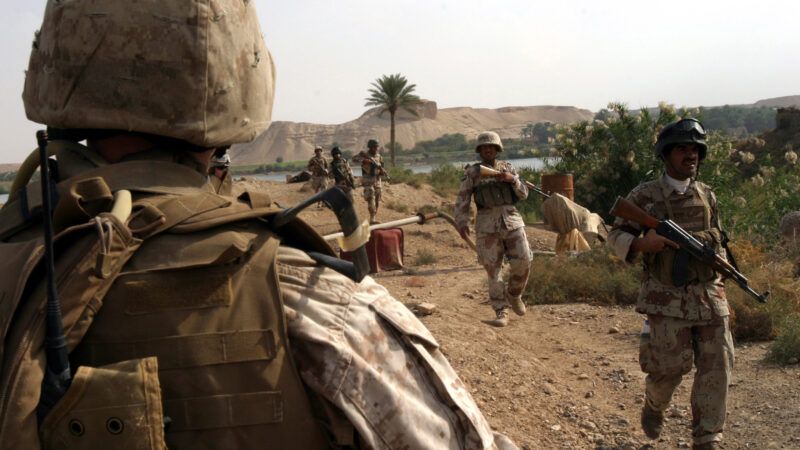The Military Tried To Hide Evidence of a Massacre. A Lawsuit Just Exposed It.
The New Yorker sued for photos of the Haditha killings in Iraq—and found audio of a Marine general bragging about covering up those photos.

The Haditha massacre was one of the worst U.S. actions during the Iraq War. After a roadside bomb killed a Marine in the town of Haditha in November 2005, the rest of his squad shot dead 24 unarmed Iraqi men, women, and children, many of them inside their own homes. The Marine Corps then lied about it, claiming that the victims were all killed by the bomb or by running gun battles with insurgents.
Only dogged reporting by Time Magazine forced the military to open an investigation. No one was ever jailed for the killings or the coverup. Staff Sgt. Frank Wuterich, the commander of the squad, pleaded guilty to one count of dereliction of duty and was demoted.
The military avoided a public relations disaster, Gen. Michael Hagee would later brag, because graphic photos of the massacre were never published. Until now.
In the Dark, a true crime podcast published by The New Yorker, dedicated its latest season to re-investigating the Haditha massacre. The producers filed Freedom of Information Act (FOIA) requests for the U.S. military's files on the incident, then sued when the military refused to hand them over.
Officials claimed they were withholding photos of the massacre out of respect for the victims' families. Two survivors, Khalid Salman Raseef and Khalid Jamal, then went around Haditha collecting signatures for a petition to release the photos. They won the support of 17 relatives of the victims.
The military gave in. On Tuesday, with permission from the survivors, The New Yorker published several unredacted crime scene photos taken by investigators and by Lance Cpl. Ryan Briones and Lance Cpl. Andrew Wright, two Marines who arrived shortly after the massacre.
The FOIA files also included a recording of a 2014 interview between Hagee and a Marine Corps historian, meant for internal use. The massacre "could have been horrific for the Marine Corps if we did not handle that correctly. Another My Lai. Or another Abu Ghraib," Hagee claims, referring to the My Lai massacre, which helped turn American opinion against the Vietnam War, and the Abu Ghraib prison in Iraq, where U.S. soldiers and CIA officers were photographed torturing and sexually assaulting inmates.
Hagee "learned from" the Abu Ghraib scandal not to let Briones and Wright's photographs of the Haditha killings be published. "Those pictures today have still not been seen, and so I'm quite proud of that," he says.
Indeed, the photos are pretty shocking; the victims range from a three-year-old girl to a 76-year-old man. "I'll never be able to get that out of my head. I can still smell the blood. This left something in my head and heart," Briones told The Los Angeles Times in 2006.
One of the photos shows the body of Ayda Yassin Ahmed surrounded by her three dead daughters and her dead son. "Knowing it was a kid, I still shot him," Lance Cpl. Stephen Tatum told U.S. military investigators, according to Naval Criminal Investigative Service (NCIS) notes also released under FOIA. Tatum later denied making that statement, and his lawyer declined to let The New Yorker interview him.
Another photo shows what appears to be the execution of a mother and her child. Asmaa Salman Raseef lies dead on the ground, her arm wrapped around the body of her son Abdullah, as if she is shielding him. NCIS investigators concluded that the boy was shot from close range.
A version of one of The New Yorker's photos had previously been obtained and published by The Washington Post in 2007. It shows the bodies of five college students spread out around the car they had been riding in, with a Marine standing over them.
Some of the Marines claimed that the students were running, which is why they were mistaken for insurgents and shot. According to retired homicide detective Kevin Parmelee, who was interviewed for the podcast, the photo suggests that at least one of the college students was kneeling on the ground when he died. Iraqi witnesses told NCIS the same thing.
Photos, eyewitness statements, and NCIS records also show that the Marines lied about killing Jamal's father and uncles in self-defense. After Jamal's family surrendered their legally-owned rifles to the troops, The New Yorker concluded, the Marines separated out the men, shot two of Jamal's uncles in a doorway, shot Jamal's father while he was sitting against a wall, and shot Jamal's third uncle while he hid in a wardrobe.
Haditha has suffered a lot of other violence since then. After the near-collapse of the Iraqi government in 2014, Haditha was one of the few towns in the area that resisted the Islamic State. Locals paid a heavy price, with 400 people dying in a nine-day battle.
But Jamal never stopped thinking about the day the Marines took away his father and uncles. He even found Wuterich on Facebook, and considered sending a message, Jamal tells In the Dark. "How did they die? Did they die like brave men, or were they scared? Like, what happened?" he wanted to ask.
The FOIA case gave Jamal an answer, albeit a sad one. The photos of his father and uncles were not published in The New Yorker article.
For the rest of us, the release of the photos should be a chance to reflect on the Iraq War. Americans often think of that war as a mistake to walk away from. But the desire to move on has allowed American leaders to sweep a lot of deceptive and dangerous behavior under the rug. And forgetting how bad the last big war was is perhaps making it too easy to sell the next one.


Show Comments (66)